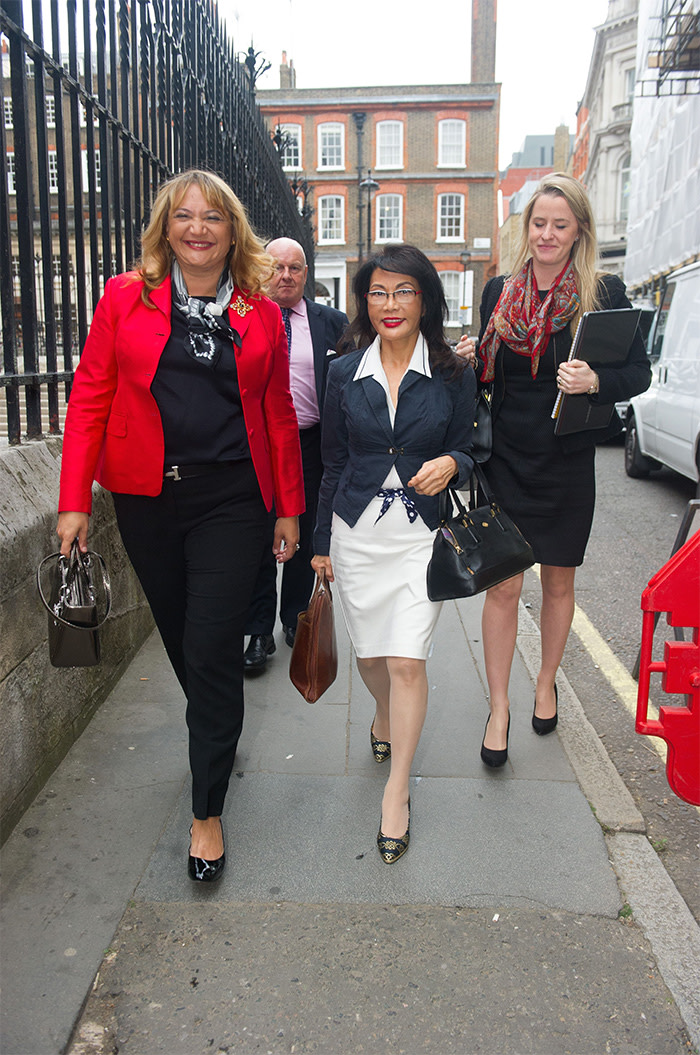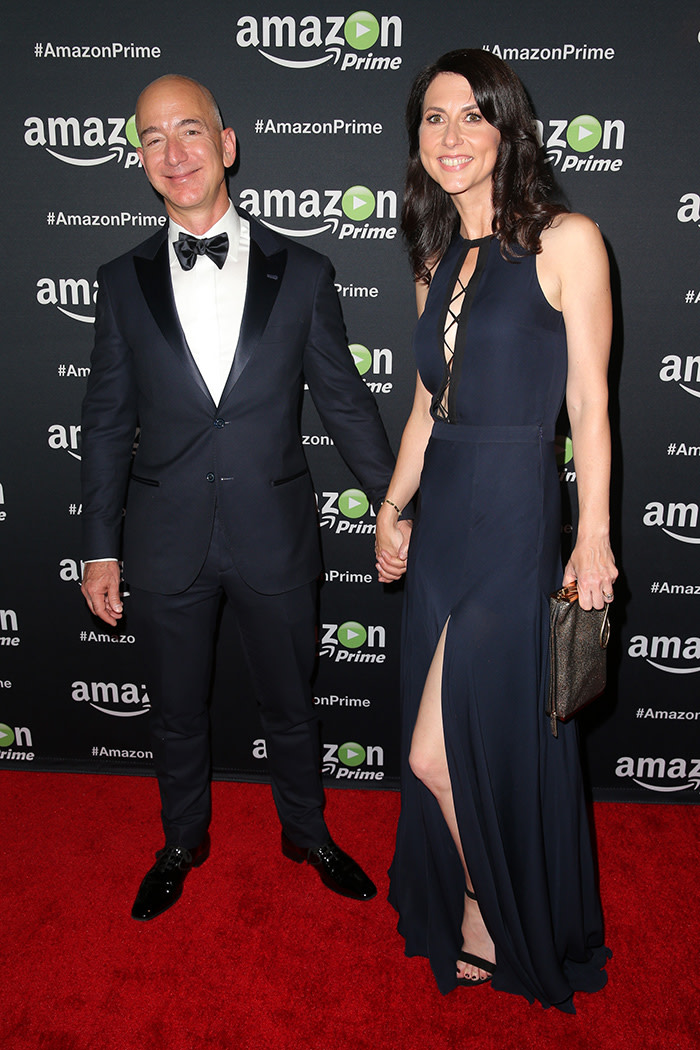Rich divorcees face strains in new-found financial freedom

Roula Khalaf, Editor of the FT, selects her favourite stories in this weekly newsletter.
There are many clichés about wealthy female divorcees, but Ayesha Vardag has no time for them. “When women get the share they are entitled to, it is not just so they can buy handbags or go to galas,” the divorce lawyer says. “There is this tremendous fear of the future. You are free, but what you have left is a vacuum.”
Vardag, president and founder of Vardags, a London-based law firm specialising in divorce, knows what she is talking about. Divorced herself, she was called “The Diva of Divorce” by Time magazine — a sobriquet she quotes on her firm’s website — thanks to her handling of many high-profile divorces. Among them are cases involving the wife of a Qatari prince, a Malaysian beauty queen and the former Marchioness of Northampton.
Rich people’s divorces make the headlines. One of the most recent was the split this year of Jeff Bezos, the founder of Amazon, from his wife MacKenzie — making her one of the richest women in the world. Her position highlights the narrative of a low- or non-earning spouse who suddenly becomes independently wealthy. But behind the drama, the transition raises many questions, not least about how to manage the money.
Divorce settlements are a growing challenge for the wealth management industry, too. Most of its clients are men, but a growing proportion are women. By 2025, about 53 per cent of UK millionaires will be female, according to the Centre for Economics and Business Research, a consultancy. Many of these women will be entrepreneurs, though women are still more likely to come into wealth in other ways, including emotionally charged circumstances such as divorce. The circumstances matter. Divorced women may have a different appetite for risk to their male counterparts, advisers say, and may never have had to manage their own fortune before. Only one in four women has an accurate picture of joint finances while in a relationship, according to Netwealth, a London-based financial adviser.

For the non-earning spouse, the first step in building a financial life after divorce is to establish cash flow requirements, advisers say. Regardless of the size of a fortune, newly divorced women need to take the time to understand their settlements and make decisions about their lifestyles.
Change can be a difficult subject to broach with clients undergoing the dissolution of a marriage. After divorce, clients often crave continuity or security, but this can be a mistake, says Charlotte Ransom, Netwealth chief executive. “There can be a desire to keep the family home, which could be hugely valuable. But by staying there you will make it much less easy to fund other things you want to do.”
Wealth managers also consider the client’s history. Individuals who come from a moneyed background or have been active participants in business or family wealth management during their marriage may have a certain literacy. They may be confident in identifying as a wealthy person in ways that people who receive wealth in a windfall, including divorce, do not.
“The wealth isn’t necessarily new to them because they’ve been living this lifestyle, but it’s a shock to them that they’re on their own,” says Ed Green, financial planning director of Close Brothers, the UK private bank. The priority is building a level of confidence and understanding about how to approach managing a fortune.
Yet advisers should not assume lack of financial literacy means lack of ability to master the subject if provided with the right material. “Women don’t like being patronised,” says Ransom. “If they’re not financially sophisticated, they appreciate being able to talk in lay terms about what their goals and fears are.”

One of the first decisions new divorcees have to make, says Sarah Whitten, a partner at law firm Charles Russell Speechlys, is who should manage their wealth. “Often, husbands will suggest that [their ex-wives] stay with their advisers, which gives [the husbands] some level of oversight,” she says. She recommends instead that women find their own advisers.
Emerging from divorce can be an opportunity to decide freely what to pursue as an individual, rather than navigating the world as a couple. When businesswoman Annabel Wilson left her job as a strategic brand director to follow her wealthy husband to Los Angeles, she focused on philanthropy.
While life was comfortable, she found she had lost her sense of purpose and contact with ordinary people. “There were some days when I realised everyone I was seeing that day was someone that I paid.” she says. After her divorce, she began consulting work and remembers with pride the first time she took her two children on a family holiday that she had paid for herself, even though she also had a generous divorce settlement. “It felt so empowering,” she says. She has set up a profit-for-purpose business called Living Ashram, which offers app-based wellbeing toolkits and dedicates a quarter of its profits to charity.
Wilson had a financially comfortable background but says that does not mean she was fully prepared for managing her new wealth. “I don’t think I had formal financial knowledge. Even if you went to the best schools, it’s not something that’s taught to you.”
Many women in high net worth couples quit their careers to be the main child-raising partner, often because their husbands are the higher earners or because the demands of building a fast-growing business require total commitment from one spouse, often the man.

Susan Rounds, director of wealth management at Deutsche Bank in Los Angeles, emphasises the importance of understanding how a client views the wealth created during their marriage. If women helped invest or contributed to wealth generation, they may feel they have helped build the fortune, she argues. But “if they feel like they got a windfall, there can be a feeling of guilt or unworthiness”, she adds.
Many of her married friends, Wilson says, have to ask their husband’s permission for small discretionary spending. “Even if you’re a full-time stay-at-home mother, you’ve been working, you’ve been making the family’s life possible, so why do you need to ask permission?” she says. Whitten adds that if a wife has been “conditioned for years to think of it as ‘your [husband’s] money’, not ‘our money’, it can be very difficult to feel that you own it, and you deserve it”.
One answer to the emotional difficulties of handling a fortune a divorcee may have had no hand in creating, is philanthropy. This can help build a sense of purpose for women who have taken a more passive role in family finances during their marriages.
Being involved and informed in the wealth management process while married can also help women navigate a large fortune after divorce. Having a separate life beyond the marriage, whether that is a career or a deep involvement with charitable causes, is another way to build confidence in dealing with finances. Wilson believes that while it is important in a marriage to have a joint bank account as a sign of trust in a partnership, women should also have their own separate account to retain a sense of identity.
There are ways that women can financially protect themselves during the divorce process to help ease the transition to independence when the marriage has ended. “Keeping the capital assets gives you something concrete, an asset that grows in value,” says Vardag. “Get the house, or one of the houses.” But be prepared to sell it, she adds.
Vardag warns against agreeing to accept maintenance from a wealthy partner, rather than a lump sum, unless it is paired with significant assets. “Maintenance might make you feel rich for a while, but it is not under your control if your ex-partner’s circumstances change,” she says. “It can all disappear into the mist. It is better to have your assets squared away. It is easier to become friends [with an ex] if you don’t have a transactional relationship.”
Ransom says there is a “cynical narrative” that women who come into extraordinary wealth spend extraordinary wealth. But this, she says, underestimates the potential of many divorced women. “Often they have had a back seat when it comes to finance, yet with new-found freedom and a better understanding of how their money can be put to work, they are a force to be reckoned with,” she says.
For many wealthy women who take control of their finances, then, divorce is only the beginning.
This article has been revised since its original publication to make clear that Living Ashram is a profit-for-purpose business which dedicates a quarter of its profits to charity.
Comments